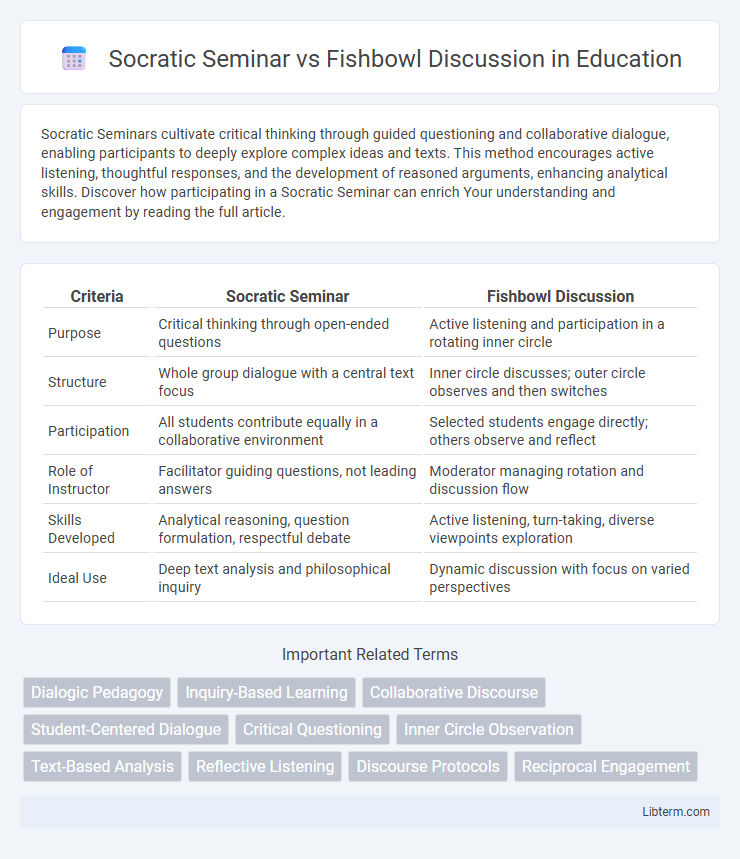Socratic Seminars cultivate critical thinking through guided questioning and collaborative dialogue, enabling participants to deeply explore complex ideas and texts. This method encourages active listening, thoughtful responses, and the development of reasoned arguments, enhancing analytical skills. Discover how participating in a Socratic Seminar can enrich Your understanding and engagement by reading the full article.
Table of Comparison
| Criteria | Socratic Seminar | Fishbowl Discussion |
|---|---|---|
| Purpose | Critical thinking through open-ended questions | Active listening and participation in a rotating inner circle |
| Structure | Whole group dialogue with a central text focus | Inner circle discusses; outer circle observes and then switches |
| Participation | All students contribute equally in a collaborative environment | Selected students engage directly; others observe and reflect |
| Role of Instructor | Facilitator guiding questions, not leading answers | Moderator managing rotation and discussion flow |
| Skills Developed | Analytical reasoning, question formulation, respectful debate | Active listening, turn-taking, diverse viewpoints exploration |
| Ideal Use | Deep text analysis and philosophical inquiry | Dynamic discussion with focus on varied perspectives |
Introduction: Understanding Socratic Seminars and Fishbowl Discussions
Socratic Seminars center around open-ended questioning to explore complex ideas through guided dialogue, encouraging deep critical thinking and reflective listening. Fishbowl Discussions involve a smaller group actively discussing a topic in the center while observers listen, promoting participation dynamics and multiple perspectives. Both methods emphasize collaborative learning but differ in structure and participant roles, enhancing comprehension and analytical skills.
Definition and Core Principles of Socratic Seminars
Socratic Seminars are structured discussions centered on deep questioning and critical thinking, grounded in Socratic questioning techniques that prioritize open-ended inquiries and reflective dialogue. Core principles include fostering active listening, encouraging evidence-based responses, and promoting collaborative exploration of complex ideas without predetermined answers. Unlike Fishbowl Discussions, which involve rotating participants in an inner-outer circle dynamic to observe and discuss, Socratic Seminars maintain a continuous, egalitarian participant engagement focused on dialogue rather than observation.
What is a Fishbowl Discussion? Key Features and Structure
A Fishbowl Discussion is an interactive group dialogue format where a small group of participants sits in an inner circle to discuss a topic while the larger group observes from an outer circle. Key features include rotating participants, active listening, and focused conversation that promotes inclusivity and diverse viewpoints. Its structure involves an initial set of speakers engaging in dialogue, followed by observers joining the inner circle to contribute, ensuring dynamic participation and deeper understanding.
Historical Origins: Socratic Method vs Fishbowl Technique
The Socratic Seminar originates from the classical Greek philosopher Socrates, who utilized guided questioning to stimulate critical thinking and illuminate ideas through dialectic dialogue. The Fishbowl Technique, developed in the 20th century as a collaborative learning strategy, involves an inner circle engaging in discussion while an outer circle observes, fostering multiple perspectives and active listening. Both methods emphasize interactive discourse but have distinctly different historical contexts rooted in ancient philosophy versus modern educational practices.
Classroom Implementation: Setting Up Each Discussion Format
Socratic Seminar setup requires arranging students in a circle to promote equal participation and eye contact, with a focus on open-ended questions driving critical thinking. Fishbowl Discussion involves an inner circle of active participants surrounded by an outer circle of observers, allowing students to alternate roles and engage in reflective listening. Both formats benefit from clear guidelines, a focused discussion prompt, and a facilitator to guide dialogue and maintain respectful communication.
Student Roles and Participation Dynamics
In a Socratic Seminar, students assume the role of active questioners and responders, engaging in open dialogue to explore complex ideas through critical thinking and collaborative inquiry. Participation dynamics emphasize equal contribution, with students building on peers' insights to deepen understanding while the teacher acts primarily as a facilitator. In contrast, a Fishbowl Discussion divides students into inner and outer circles, where inner circle participants engage in focused conversation while outer circle students observe and later provide feedback, promoting varied participation roles and reflective listening.
Benefits of Socratic Seminar: Critical Thinking and Dialogue
Socratic Seminars foster critical thinking by encouraging participants to analyze complex texts and ask open-ended questions that deepen understanding. This method promotes active dialogue where students build on each other's ideas, enhancing collaborative learning and communication skills. Engaging in Socratic Seminars helps develop higher-order thinking by requiring evidence-based reasoning and reflection.
Advantages of Fishbowl Discussion: Engagement and Observation
Fishbowl discussion enhances engagement by allowing participants in the inner circle to actively contribute while observers remain attentive and reflective, fostering a dynamic and inclusive dialogue. This format encourages diverse perspectives as participants rotate, promoting deeper understanding through both speaking and listening roles. Fishbowl settings also improve observational skills, enabling participants to critically analyze communication styles and content within a controlled, interactive environment.
Challenges and Limitations of Both Methods
Socratic Seminars often face challenges such as dominating voices overshadowing quieter participants and difficulties in keeping discussions focused on open-ended questions without veering off-topic. Fishbowl Discussions can be limited by spatial constraints, as only a few participants actively engage inside the "fishbowl," which may lead to passive observation without meaningful contribution from outer circle members. Both methods require skilled facilitation to manage group dynamics and ensure equitable participation, highlighting their reliance on instructor expertise for effective implementation.
Conclusion: Choosing the Right Format for Your Classroom
Selecting between Socratic Seminar and Fishbowl Discussion depends on your educational goals and classroom dynamics. Socratic Seminars foster deep individual critical thinking and extended dialogue, ideal for exploring complex texts. Fishbowl Discussions promote active listening and collaborative participation, suitable for ensuring all students engage in a structured, observable debate environment.
Socratic Seminar Infographic

 libterm.com
libterm.com